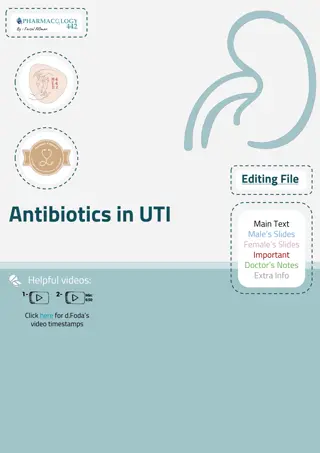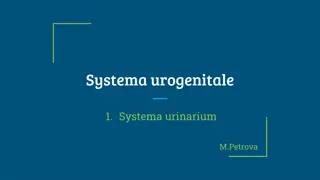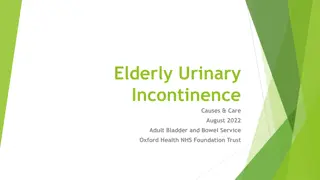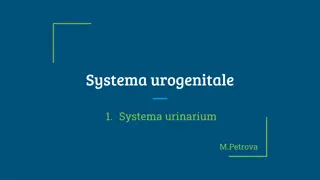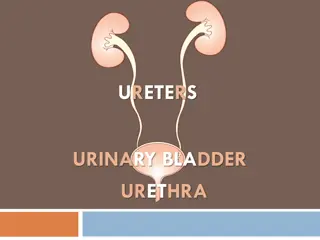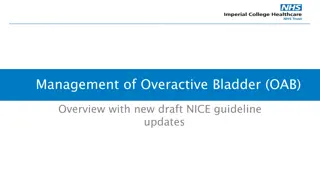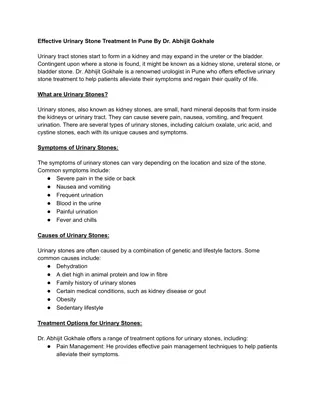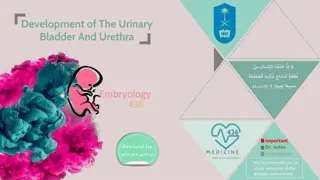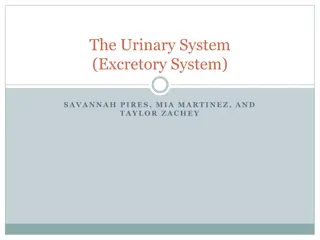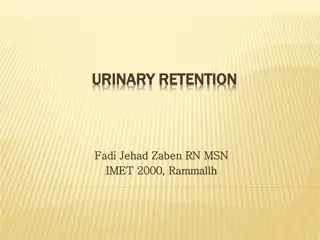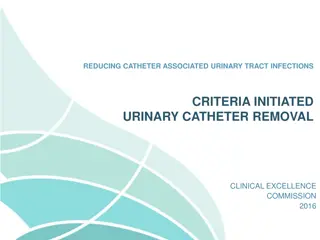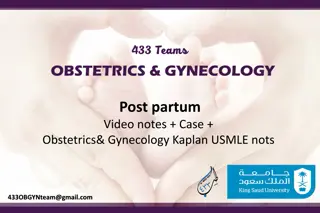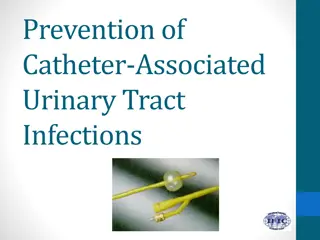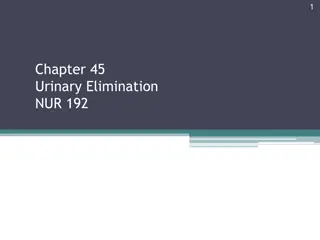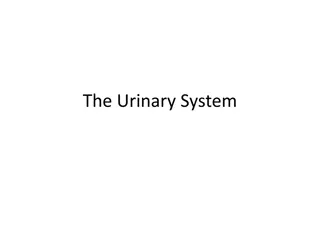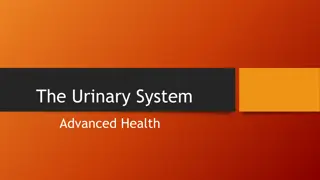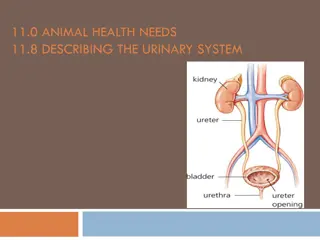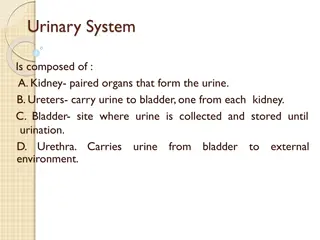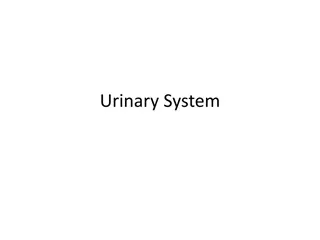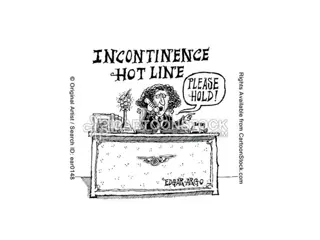Understanding Urinary Elimination: Anatomy, Physiology, and Function of the Kidneys
The lecture covers the fundamentals of urinary elimination focusing on the kidneys' location, structure, function, and the role of nephrons. It discusses the transport of urine through the ureters to the bladder, highlighting the bladder's muscle layers and the urethra's role in expelling urine. Stu
2 views • 37 slides
Understanding Urinary Tract Infections (UTIs) and Antibiotics: A Comprehensive Overview
Urinary Tract Infections (UTIs) are a common issue, more prevalent in women, with causes ranging from poor hygiene to underlying health conditions. The content delves into the classification of UTIs, their main causes, and bacteria responsible for infections. It also covers the complications of UTIs
0 views • 12 slides
The Best Urinary Incontinence– Healthy Lifestyle Bariatrics
You're looking for one of the best urinary incontinence services in the United States offered by Healthy Lifestyle Bariatrics. Gynecomastia surgery, excessive cholesterol, and other therapies involving many body modification procedures are offered. If you need more information, please visit our webs
0 views • 9 slides
Understanding the Urinary System: Anatomical Structures and Terms
This informative content delves into the anatomical structures and terms related to the urinary system, covering key components such as the kidneys, ureters, bladder, and urethra. It explains important terms like renal pyramids, calices, and ureter dexter/sinister, providing a comprehensive overview
1 views • 8 slides
Understanding Urinary Incontinence in the Elderly
The urinary system plays a vital role in regulating blood volume, pressure, and waste excretion. Urinary incontinence in the elderly can be caused by weak bladder muscles or neurological issues. The bladder consists of 4 layers, each serving a specific function. Normal voiding frequency and bladder
0 views • 50 slides
Understanding Medications and Pharmacological Therapy for Urinary Incontinence
This learning module for clinicians discusses the physiology of bladder control, age-related changes in the genitourinary system, medications that contribute to urinary incontinence, pharmacological treatments for UI, side effects of medications used for UI, and a senior-friendly approach to optimiz
0 views • 30 slides
Overview of Urinary System Anatomy and General Terminology
This content provides detailed information on the anatomy of the urinary system, including the kidneys, ureters, bladder, and urethra. It explains anatomical terms, Greek term elements related to the system, and general terms for urine and urination. Additionally, it covers urinary dysfunctions such
1 views • 8 slides
Veterinary Guide to Urinary System Examination
This guide covers the examination of the urinary system in veterinary medicine, including collection and analysis of urine samples. It discusses different aspects such as color, volume, transparency, specific gravity, and common interpretations based on findings. Through clear illustrations and deta
0 views • 19 slides
Understanding Disposable Body Worn Incontinence Pads FAQs
This content provides answers to frequently asked questions about absorbent disposable body worn incontinence pads. Topics covered include how these pads work, factors inhibiting absorption, types of pads available, proper disposal methods, odor control, and more. Helpful information for caregivers
0 views • 15 slides
Understanding the Anatomy of Ureters, Urinary Bladder, and Urethra
Explore the detailed anatomy of ureters, urinary bladder, and urethra in this comprehensive guide. Learn about the course of ureters, important relations of the urinary bladder, and differences in male and female urethra. Discover the sites of ureteric constrictions, arterial blood supply, and more.
0 views • 22 slides
Management of Overactive Bladder (OAB) - Overview and Guidelines Update
Learn about the assessment, tests, conservative and surgical management options for Overactive Bladder (OAB) based on the new draft NICE guideline updates. Understand the categorization of urinary incontinence types, urine testing protocols, bladder diaries, quality of life assessments, and the role
1 views • 30 slides
Urinary Stone Treatment In Pune
Urinary stones, including kidney stones and bladder stones, can be a painful and disruptive condition that affects many individuals. If you are seeking expert treatment for urinary stones in Pune, look no further than Dr Abhijit Gokhale, a highly ski
1 views • 3 slides
Understanding Normal Pressure Hydrocephalus: Clinical Features and Diagnosis
Normal Pressure Hydrocephalus (NPH) is a condition characterized by the classic triad of dementia, urinary incontinence, and gait disturbance. Learn about the history, types, diagnostic studies, and presentation of NPH, along with differentiating it from other diseases. Discover the current standard
0 views • 30 slides
Physiotherapy Support for Mothers with OASI - Expert Guidance and Rehabilitation
Providing specialized physiotherapy support for mothers experiencing Obstetric Anal Sphincter Injuries (OASI) is crucial for addressing immediate problems like pain, urinary or fecal incontinence, and more. With a focus on pelvic health, this approach involves reassurance, tailored pelvic floor musc
0 views • 12 slides
Anaesthetic Management of 11-Year-Old Female with End-Stage Renal Disease (ESRD) for Renal Transplant and Ileal Conduit
An 11-year-old female child with end-stage renal disease (ESRD) and multiple surgical histories was evaluated for renal transplant and ileal conduit surgery. The patient presented with hypertension, chronic kidney disease, neurogenic bladder, and urinary incontinence. Preoperative assessments reveal
0 views • 22 slides
Development of the Urinary Bladder and Urethra in Embryology
Understanding the embryonic development of the urinary bladder and urethra involves studying the formation of the cloaca, division of the urogenital sinus, absorption of mesonephric ducts, position and fate of the urachus, and anomalies related to these structures. The cloaca, primitive urogenital s
0 views • 14 slides
Understanding Bowel and Bladder Issues Post Stroke
Bowel and bladder incontinence are common after a stroke, often due to brain damage affecting control functions. Factors like mobility can exacerbate these issues, leading to discomfort, infections, and other complications. Managing incontinence involves assessing individual needs, recognizing signs
0 views • 10 slides
Understanding the Urinary System: Function and Structure
The urinary system, also known as the excretory system, plays a crucial role in regulating water and salt levels in the body, as well as excreting wastes through urine. It consists of organs like the kidneys, ureters, bladder, and urethra, each with specific functions in the filtration and eliminati
0 views • 18 slides
Gynecological Surgical Complications and Treatment Overview
This content covers complications in gynecological surgery, historical perspectives on prolapse and incontinence surgery, treatment methods like weight reduction, pelvic floor training, medication, injections, and surgeries like Burchplasty and Tension-free Vaginal Tape (TVT). It also discusses a mu
0 views • 27 slides
Surgical Treatment and Complications in Gynecology: Review of Methods and Outcomes
Exploring the complexities of gynecological surgical procedures, this content delves into historical perspectives on prolapse and incontinence surgeries, the efficacy of various treatment approaches including weight management and surgical interventions like TVT, and the evolution of surgical techni
0 views • 26 slides
Understanding Urinary Tract Wellness and Illness with Prof. Dr. Rabea M. Ali
The urinary system plays a vital role in our overall health by regulating blood volume, composition, pressure, pH balance, and more. Keeping the urinary tract healthy involves proper hydration, diet choices, and lifestyle habits. Foods like berries, yogurt, garlic, and antioxidants can promote urina
0 views • 41 slides
Understanding Urinary Retention: Definition, Causes, and Management
Urinary retention is the inability to completely empty the bladder, often leading to overflow incontinence. It can result from various factors such as diabetes, prostate enlargement, neurological disorders, and certain medications. This condition can pose complications and requires proper diagnostic
0 views • 24 slides
Strategies for Preventing Catheter-Associated Urinary Tract Infections
Catheter-associated urinary tract infections are a common healthcare-associated infection, with 80% of hospitalized patients experiencing a urinary tract infection. This article provides guidelines for preventing CAUTIs, such as only catheterizing patients when necessary, maintaining asepsis, practi
0 views • 20 slides
Postpartum Care and Physiologic Changes: A Comprehensive Guide
Explore the normal physiologic changes and components of postpartum care, including reproductive and urinary tract changes, gastrointestinal adjustments, cardiovascular modifications, and psychosocial considerations. Learn about managing postpartum issues like hemorrhoids, stress urinary incontinenc
0 views • 11 slides
NYS Medicaid Incontinence Supply Management Program Overview
The NYS Medicaid Incontinence Supply Management Program, initiated in August 2016, aims to improve the quality of incontinence products provided to all Medicaid members by establishing minimum quality standards, reducing costs, and maintaining existing provider networks. The program covers a range o
0 views • 19 slides
Urinary Tract Infection Treatment and Prevention During Pregnancy
Effective management of urinary tract infections (UTIs) during pregnancy involves promoting urinary health, emphasizing safety of antimicrobial treatment, and understanding FDA categories for medication use. Recommendations include fluid intake, perineal hygiene, and maintaining bladder health. Safe
0 views • 13 slides
Preventing Catheter-Associated Urinary Tract Infections
This presentation covers the prevention of catheter-associated urinary tract infections (CAUTIs) in healthcare settings. It highlights the significance of urinary tract infections, risk factors, preventive measures, and common microbiology involved. Key topics include the importance of urine collect
0 views • 34 slides
Understanding Urinary Elimination and Related Health Conditions
The urinary system plays a vital role in removing waste from the body through organs like the kidneys, ureters, bladder, and urethra. Various factors influence urination, including brain structure and disease processes such as diabetes, multiple sclerosis, and ESRD. Dialysis is an important treatmen
0 views • 28 slides
Stroke Continence Protocols for Managing Bladder and Bowel Function After Stroke
This protocol outlines the management of urinary and bowel incontinence in stroke patients, emphasizing high nursing care levels and avoiding unnecessary catheterization. It discusses normal bladder functions, urinary dysfunction prevalence post-stroke, and interventions for promoting continence. Ur
0 views • 30 slides
The Essentials of the Urinary System
The urinary system plays vital roles in maintaining internal balance, filtering fluids, regulating blood volume and pressure, and producing essential hormones. Consisting of organs like the kidneys, ureters, bladder, and urethra, the system functions through processes like urine formation, tubular r
0 views • 13 slides
Understanding the Urinary System: Functions and Disorders
The urinary system, also known as the renal system, is responsible for producing, storing, and eliminating urine. It includes the kidneys, ureters, bladder, and urethra. This system works with other organs to maintain the balance of chemicals and water in the body. Renal and urinary disorders such a
0 views • 6 slides
Understanding the Canine Urinary System: Functions and Parts Explained
Explore the intricate details of the dog's urinary system, including the kidneys, nephrons, ureters, urinary bladder, and urethra. Learn how these components work together to maintain proper waste filtration and blood circulation. The images provided offer a visual guide to aid in understanding the
0 views • 6 slides
Understanding the Human Urinary System
The human urinary system consists of the kidneys, ureters, bladder, and urethra. The kidneys filter blood to produce urine, which is carried to the bladder through the ureters for storage until excretion. Each kidney is structured with renal pyramids and nephrons for blood filtration and waste remov
0 views • 16 slides
Overview of the Urinary System: Functions, Structure, and Importance
The urinary system plays a crucial role in maintaining water and salt balance, regulating pH levels, and excreting waste products like urea and uric acid. Comprising of organs such as the kidneys, ureters, urinary bladder, and urethra, this system ensures the removal of metabolic waste from the body
0 views • 34 slides
Best Dermatologist in Delhi NCR ( Non Surgical Urinary Incontinence Treatment )
Best Dermatologist in Delhi NCR\n\nAt RxRejuvenate, we believe that true beauty is a reflection of your inner self-confidence and well-being. Our clinic is dedicated to providing you with a personalized and transformative experience that enhances bot
0 views • 7 slides
Comprehensive Supportive Nursing Care for Bed-ridden Patients - A Holistic Approach
Providing supportive nursing care for bed-ridden patients like Mr. Thomas, who suffered a Cerebro Vascular Accident, requires addressing various health complications such as pressure sores, constipation, urinary incontinence, and more. Understanding the impact of dependence on the patient's life and
0 views • 17 slides
Comprehensive Overview of Urinary Incontinence in Women According to NICE Guidance
This December 2017 presentation focuses on urinary incontinence in women, outlining approaches for patients with urge, stress, and mixed incontinence in line with NICE guidance. It covers referral criteria, management strategies, and specialist referral recommendations including the 2-week rule for
0 views • 29 slides
Understanding Voiding Disorders in Children: An Overview by Dr. Manas Kr. Mahapatra
Voiding disorders in children, also known as bladder dysfunction, are a common issue affecting up to 40% of pediatric urology clinic visits. These disorders can indicate underlying pathophysiology requiring treatment to prevent renal or urologic damage. The development of urinary control by age 5 is
0 views • 53 slides
Understanding Urogynaecology: A Comprehensive Overview
Urogynaecology is a subspecialty of Gynaecology that focuses on female lower urinary tract and genital tract issues. This field has evolved significantly with the introduction of Urodynamics in 1970, leading to better diagnoses and management of conditions like urinary incontinence and pelvic organ
0 views • 31 slides
Understanding Overactive Bladder: Symptoms and Treatment Options
Overactive bladder (OAB) is a common condition characterized by urinary urgency, frequency, and sometimes incontinence. It significantly impacts quality of life and can affect individuals of all ages, with higher prevalence in older populations. Treatment options include drug therapy, bladder traini
0 views • 47 slides

